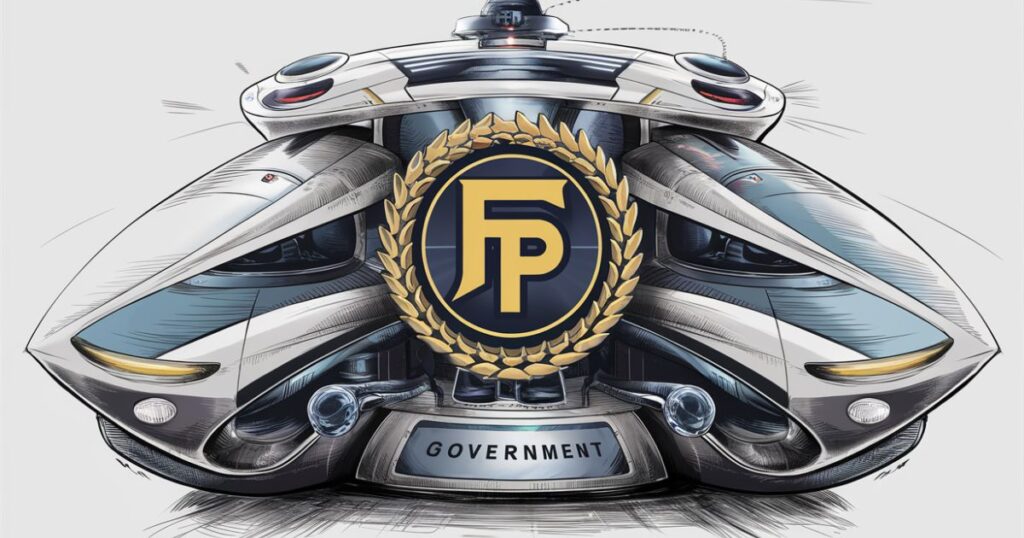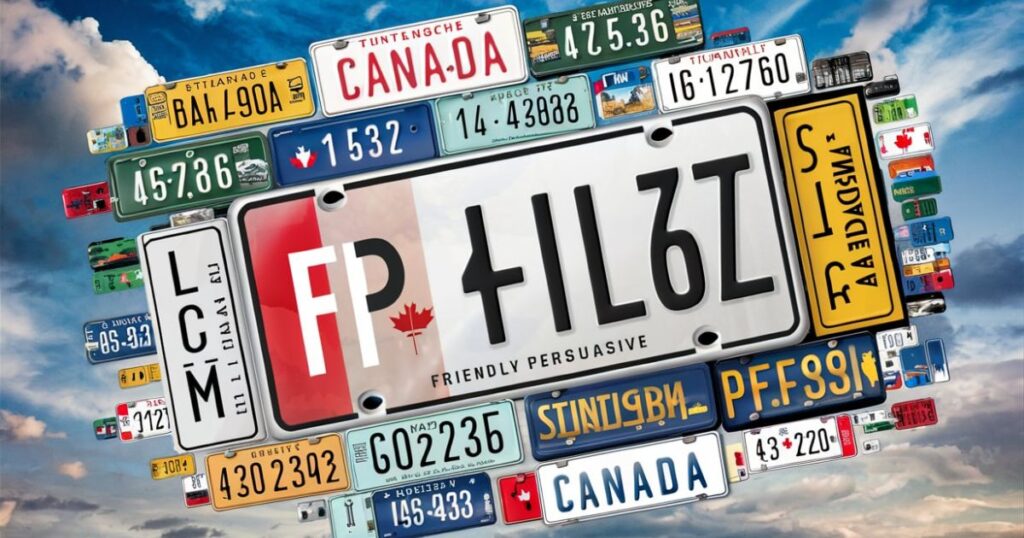“FP” on a license plate stands for “Fleet Plate.” It signifies that the vehicle belongs to a company or organization with multiple vehicles. These plates simplify registration and management for businesses. They help identify fleet vehicles on the road.
“FP” stands for different things depending on where you are. Whether it’s Fleet Plate, Farm Plate, or Federal Plate, each designation carries its own significance. The mystery behind “FP” and explore its meaning on license plates.
“FP” on a license plate typically stands for “Fleet Plate”. These plates are used for vehicles owned by businesses or organizations with multiple vehicles. It helps authorities easily identify and manage these fleet vehicles. FP plates streamline administrative tasks like registration and renewal for companies with large vehicle fleets.
Understanding License Plate
Understanding license plates is essential for both automobile proprietors and regulatory authorities. A registration code serves as a unique identifier for cars, permitting law enforcement, insurance agencies, and authorities corporations to music and control vehicle registrations effectively.
These plates comprise a combination of letters and numbers that offer vital data about the automobile, such as its registration repute, origin, and specific designations like fleet or farm use. Knowing that means in the back of specific registration code codes, inclusive of “FP,” can assist make sure compliance with neighborhood laws and take gain of any associated benefits or exemptions.
Agricultural Use and Regulations
Agricultural use and regulations for motors with the “FP” license plate are designed to support farmers and agricultural organizations. These license plates generally permit for tax exemptions and reduced registration expenses, acknowledging the important position of these motors in farming operations.
However, motors with an “FP” registration code are often subject to unique restrictions, which include barriers to the utilization of farm-associated sports and targeted routes. Compliance with these rules guarantees that the advantages meant for agricultural aid are correctly applied, fostering efficiency and sustainability in the agricultural quarter.
The Role of FP in Government Vehicles

The “FP” designation on government vehicles’ license plates signifies Federal Plates. These plates are used to identify vehicles owned and operated by federal government agencies. Understanding the role of FP in government vehicles involves exploring its purposes, benefits, and regulatory framework.
Purposes of FP License Plates in Government Vehicles
- FP license plates provide a clear and consistent way to identify government-owned vehicles. This is crucial for maintaining accountability and ensuring that these vehicles are used appropriately.
- The unique designation helps in tracking and managing the fleet, ensuring that each vehicle is accounted for and used for its intended purpose.
Benefits of FP License Plates for Government Vehicles
- Federal government vehicles often receive exemptions from state and local registration fees, reducing operational costs.
- In some jurisdictions, these vehicles might also be exempt from certain taxes, further lowering expenses.
A State-by-State Guide to FP License Plates in the USA
A state-by-state guide to FP license plates in the USA reveals the diverse meanings and regulations associated with this designation across different regions. In Illinois, “FP” on a license plate stands for Fleet Plate, simplifying registration for businesses with multiple vehicles.
New York uses “FP” to denote farm plates, highlighting vehicles primarily used for agricultural purposes and providing specific tax exemptions and usage restrictions. This guide helps vehicle owners understand the implications of FP license plates, ensuring compliance with state-specific laws and maximizing associated benefits.
The Legal Implications of FP License Plates

The legal implications of FP License Plates are significant. They denote specific vehicle categories like fleet, farm, or federal vehicles. Owners must follow rules specific to their vehicle type. They must adhere to usage regulations, registration requirements, and local legal guidelines.
Fleet cars need meticulous report-preserving and periodic inspections. Farm vehicles face challenges on where and how they may be driven. Car proprietors must understand these legal responsibilities to avoid penalties. This understanding also helps them benefit from any associated privileges or exemptions.
Benefits of FP License Plates for Fleet Management
FP License Plates offer significant advantages for fleet management. These plates streamline the registration method by way of allowing businesses to check in a couple of automobiles underneath a single fleet account, reducing administrative burden and office work.
They additionally allow smooth identification and tracking of fleet cars, aiding in efficient control and compliance with rules. Additionally, groups can gain from capability value savings through bulk registration reductions and simplified renewal approaches. Overall, FP License Plates beautify operational efficiency, ensure regulatory compliance, and make a contribution to higher aid control for businesses with big car fleets.
- FP license plates streamline the registration method for organizations coping with fleets of vehicles. Instead of registering every automobile personally, groups can check in them underneath an unmarried fleet account, lowering paperwork and administrative burden.
- Fleet plates frequently come with discounted registration prices, saving companies money in comparison to registering each vehicle separately.
- FP license plates make it smooth to become aware of fleet motors on the road, aiding in logistical management and tracking.
Tax and Insurance Considerations for FP (Farm Plates)
When considering tax and coverage for vehicles with Farm Plates (FP), it’s crucial to understand their impact on prices and coverage. In many areas, vehicles with farm plates may qualify for tax exemptions or reduced fees due to their agricultural use.
However, coverage vendors may offer one-of-a-kind rules and charges based totally at the license plate type. Farm vehicle owners need to talk accurately with their coverage provider approximately the particular utilization and risks related to their vehicles to ensure ok insurance.
Identification and Special Privileges
Identification and special privileges associated with license plates play a critical function in diverse contexts. License plates bearing designations together with “FP” serve as a method of identification for specific styles of vehicles, offering valuable records to law enforcement and regulatory agencies.
For example, fleet automobiles with “FP” plates might also revel in streamlined registration tactics and access to designated parking regions. Similarly, farm vehicles displaying “FP” plates might benefit from tax exemptions and insurance incentives tailored to their agricultural use. Understanding these designations is essential for each vehicle owner and government to make certain compliance and facilitate efficient control.
How to Apply for FP License Plates: A Step-by-Step Guide
Applying for FP license plates involves a series of steps to make certain that the process is smooth and compliant with local guidelines. Below is a detailed step-by-step guide:
- Before making use of FP license plates, it’s vital to investigate and understand the specific guidelines governing their issuance to your location. This may also include eligibility criteria, required documentation, and any associated costs.
- Gather all of the vital documentation wished for the utility method. This typically includes evidence of vehicle possession, identity documents for the applicant, and any extra paperwork required by way of the licensing authority.
- Obtain the relevant utility bureaucracy from the local Department of Motor Vehicles (DMV) or equal authority. Carefully fill out all sections of the form, offering correct statistics to avoid delays or rejections.
- Once the utility bureaucracy is completed, submit them in conjunction with the required documentation to the precise DMV workplace or online portal. Ensure that each file is organized and legible to expedite the evaluation system.
The History and Evolution of FP License Plates
The history and evolution of FP license plates trace back to the early days of vehicle registration systems. Initially, license plates served as mere identifiers, lacking standardized codes or prefixes like “FP.” Over time, as the number of vehicles increased, authorities implemented coding systems to categorize and manage them efficiently.
The introduction of FP plates marked a significant shift, providing specific designations for fleet, farm, or federal vehicles. This evolution reflects the growing complexity of vehicle regulation and the need for clearer identification methods. Today, FP plates continue to play a vital role in distinguishing various vehicle types on the road.
Comparing FP License Plates
When comparing FP license plates across different regions, one encounters a diverse landscape of regulations, designs, and functionalities. While the core concept of “FP” denoting fleet or farm vehicles remains consistent, nuances emerge in each jurisdiction’s implementation. In the United States, states like Illinois and New York employ FP plates for fleet and farm vehicles, respectively, each with its distinct registration processes and benefits that Wyoming license plate.
In Canada, provinces like Ontario and Saskatchewan similarly utilize FP plates but may vary in their specific regulations and eligibility criteria. Australia presents its unique system, where FP plates serve as identifiers for fleet and farm vehicles, reflecting the country’s agricultural and commercial diversity.
Common Misconceptions About FP License Plates

People often misunderstand FP license plates. Many think they are only for commercial vehicles. However, FP plates can also be for farm or federal vehicles.
Some may mistakenly believe FP plates offer universal privileges or exemptions. They often overlook the specific regulations and restrictions for each plate type. FP plates serve distinct purposes like fleet management or agricultural use. Their implications vary based on regional laws and regulations.
FP Plates and Law Enforcement
FP plates play an essential function in regulation enforcement efforts, assisting officials in quickly figuring out automobiles and implementing site visitor regulations. License plate recognition structures, generally used by law enforcement corporations, depend on the specific combinations of letters and numbers on FP plates to suit automobiles with their registered proprietors and track any extraordinary violations or warrants.
This generation enhances public safety by allowing officials to rapidly cope with traffic infractions and become aware of stolen vehicles or suspects. The clear identification provided by FP plates helps streamline law enforcement processes, ensuring that vehicles are appropriately licensed and operated by local laws.
Australia’s FP License Plates
Australia’s FP license plates serve as distinctive identifiers for vehicles with specific designations, particularly fleet and farm vehicles. These plates play a crucial role in the United States’s automobile registration system, aiding in the green management of various car types.
FP license plates signify diverse meanings depending on the nation or territory, with “FP” generally denoting fleet automobiles in a few regions and farm automobiles in others. Understanding the results of FP license plates is essential for vehicle owners, law enforcement, and regulatory government to make sure compliance with nearby laws and policies governing vehicle utilization and registration.
FP License Plates in Canada

In Canada, FP license plates hold significance in vehicle identification and regulation. These plates typically denote fleet vehicles, encompassing cars, trucks, or other vehicles owned by businesses or organizations. The “FP” designation streamlines registration processes for companies managing multiple vehicles, offering administrative efficiency and uniformity.
Understanding the results of FP license plates is essential for both vehicle owners and regulation enforcement organizations. These plates help authorities identify fleet vehicles on Canadian roads and enforce relevant regulations. Whether it is for tax purposes, coverage considerations, or compliance with nearby legal guidelines, the FP registration code serves as a critical marker in the Canadian car registration panorama.
Streamlining Vehicle Registration
Streamlining vehicle registration involves optimizing the administrative process to ensure efficiency and accuracy. One crucial aspect of this streamlining effort is the issuance and management of license plates. By integrating digital systems and online platforms, authorities can simplify the application, renewal, and tracking of license plates.
Additionally, implementing standardized tactics and documentation requirements helps to lessen errors and processing times. Streamlined automobile registration benefits authorities and car owners, because it minimizes bureaucratic hurdles and ensures that motors are nicely registered and identifiable on the street.
Environmental Impact and Regulations for FP Farm Plates
“Environmental Impact and Regulations for FP Farm Plates” encompasses the crucial intersection of agricultural practices and environmental stewardship. Farm vehicles bearing FP license plates often enjoy certain regulatory exemptions, but this doesn’t negate their environmental responsibility.
Authorities increasingly enforce emissions standards and other eco-conscious regulations for such vehicles. Stricter scrutiny ensures that farming operations minimize their ecological footprint while maintaining productivity. Implementing sustainable practices alongside adhering to legal requirements is imperative for mitigating the environmental impact of farm vehicles.
- Environmental Conservation: FP farm plates often come with regulations aimed at promoting environmental sustainability. Farms play a substantial function in land use and useful resource control, and rules related to FP farm plates can also include provisions for lowering emissions, keeping water, and minimizing pollution.
- Land Stewardship: Farming activities can impact soil health, water best, and biodiversity. Regulations tied to FP farm plates may additionally attention to selling responsible land stewardship practices, such as erosion manipulation, habitat renovation, and sustainable farming techniques.
- Pesticide and Chemical Management: To protect ecosystems and human health, FP farm plates may be subject to regulations regarding the use of pesticides, fertilizers, and other chemicals. Compliance with these regulations ensures that farming activities minimize environmental negative impacts.
The Evolution of FP License Plate Designations

Significant shifts in vehicle classification and administrative practices have marked the evolution of FP license plate designations. Originally conceived as a simple method of figuring out fleet or farm cars, FP license plates have advanced to embody a broader variety of designations, reflecting changes in transportation policies and societal wishes.
As technology advances, registration code structures have grown to be extra state-of-the-art, taking into consideration more customization and records integration. Today, FP plates may incorporate advanced security features and digital elements to enhance vehicle identification and streamline administrative processes. This evolution underscores the ongoing importance of license plates in modern transportation management.
Conclusion
In conclusion, understanding the meaning of “FP” on a license plate is essential for both vehicle owners and regulatory authorities. Whether it signifies a Fleet Plate, Farm Plate, or Federal Plate, its interpretation can vary depending on the region and its specific regulations.
Knowing the implications of an What Does FP Mean on a License Plate designation facilitates vehicle owners adhering to prison necessities, gaining associated advantages, and ensuring proper car usage. By doing so, people can navigate the complexities of car registration, taxation, coverage, and usage regulations efficiently, promoting protection, compliance, and efficient transportation control.
FAQs
What does FP mean on a license plate in Illinois?
FP stands for “Fleet Plate,” indicating vehicles owned by businesses with multiple vehicles.
What is an F plate in Illinois?
An F plate is another term for a “Fleet Plate,” used for commercial vehicles owned by companies or organizations in Illinois.
What is a Michigan fleet license plate?
A Michigan fleet license plate is denoted by the letters “FP” and is used for vehicles registered under a fleet account, simplifying management for businesses with multiple vehicles.
What are fleet plates in Wisconsin?
Fleet plates in Wisconsin, often indicated by the letters “FP,” are assigned to companies with multiple vehicles, streamlining registration and administrative processes.
Do all states or countries use FP license plates?
No, interpretations of FP can vary by region, with different designations and regulations.









